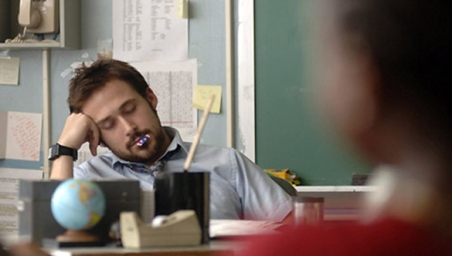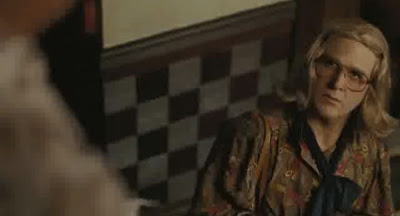Lost River is Ryan Gosling’s debut as a writer and director, it premiered last year at Cannes to an almost universally negative critical reaction. The reviews from the esteemed festival were so harsh that the film did not receive a theatrical release in America and had an extremely limited run here in the UK (it was concurrently available to download.) The reviews shared many of the same criticisms and stances on the film, the most common dismissals cited Gosling’s self indulgence, a lack of originality through comparability to films of director’s that Gosling has previously worked with, that the actor had no right to attempt to direct and that his film was nothing more than a folie de grandeur.
When critics are at a consensus it is easy to believe they must be on to something and while I look to examine and challenge that here, I would not suggest that popular critical opinion could be considered as either right or wrong. I find it more interesting to consider the factors that have led them to their opinion which I believe are further reaching than just the text itself.
“Ryan Gosling is a tremendously talented actor, but he should really leave the storytelling to someone else.” – Chris Nashawaty, Entertainment Weekly
“Gosling isn’t the first actor-turned-director to confuse the skill set on which he calls in front of the camera with the one demanded behind it. Finding himself lacking the depth of vision necessary to sustain an entire movie, he has simply resorted to doing what many errant schoolchildren have done before him. He’s copied the other boys’ homework.” – Ryan Gilbey, New Statesman
“The film proves that Gosling has refined taste in movies, and that he’s a quick study, but not that he has much to say as an artist.” – A.A Dowd, The AV Club
“Lost River is a lost cause. Ryan Gosling is an actor, he needs a writer, he needs a director. So sorry.” – David Sexton, London Evening Standard
The ultimate question that comes to my mind when reading the many negative reviews is how would this film have been perceived if it was not known that Ryan Gosling was the director? Perhaps some would argue that we wouldn’t be talking about it at all if not for the actor’s high profile. The focus in nearly of all the reviews on Gosling himself lead me to believe however that it was the main thing on the minds of most of the critics. That it would impossible to separate him from the text.
There is a tendency to categorise and compartmentalise people and things that is evident everywhere not only in film criticism, it helps us make sense of the world and it is comforting to put everything in its little box where we can understand what it is; we know that this does that and that does not do this. The sheer indignation of the critics that Gosling who they have filed away under “Actor” has dared to enter the realm of writing and directing is not surprising. An underlying resentment is present that he even has the opportunity to make a film in the first place and that entitlement is based on his acclaim as an actor and his celebrity, not on his artistic credentials. Ryan Gosling is by no means the first actor turned director to be given a hard time but there was some extraordinary vitriolic hyperbole that I believe is due not to his status as an actor but his status as a celebrity.
Due in no small part to his role in seminal teen romance film The Notebook Gosling is one of Hollywood’s current premier heartthrobs, despite playing to the strengths of his looks such as in Crazy, Stupid, Love
he has maintained highbrow credibility through eschewing traditional romantic leading man roles and instead choosing to play a man in love with a blow up doll (Lars and the Real Girl)

a drug addicted teacher (Half Nelson)
and a cross dressing murderer (All Good Things)
He has also chosen smaller films with polarising directors such as Blue Valentine and The Place Beyond The Pines with Derek Cianfrance as well as Drive and Only God Forgives with Nicolas Winding Refn. He has also managed to maintain a strong presence in the mainstream in more conventional roles in the films Fracture , The Ides of March and Gangster Squad. He is also the inspiration for several popular memes such as the “Hey Girl” feminist theory quotes (http://feministryangosling.tumblr.com/).So not only has Gosling seemingly managed to please everyone with his film choices, he is an incredibly strong cultural force, even representing an ideal embodiment of modern masculinity to both Men and Women(http://www.amazon.com/100-Reasons-Love-Ryan-Gosling/dp/0859655016/ref=pd_sim_14_2?ie=UTF8&refRID=0APNGDPVGEH6SFV33A9K). He can be sensitive while maintaining the old school masculine tough guy image as this one scene from Drive perfectly showcases:
With that being said I think it is clear that Ryan Gosling’s placement in the popular consciousness as actor and celebrity are deep rooted – that part of that image is as a heartthrob for lack of a better word.
This status carries negative connotations of vacuousness, certainly not associated with artistic endeavour. I would also strongly argue that Gosling’s massive popularity as I have outlined could easily lead to jealously and that envy is key to how Lost River has been reviewed – whether the critics were consciously aware of it or not, the relish and zeal many of them indulge in when lambasting the first time director suggests to me that they were very keen on taking him down a peg – putting him back in his place as simply an actor or worse just a celebrity as the theatre critic in Birdman put it.
The accusations of self indulgence are easy to understand if we consider “Ryan Gosling” as the ethereal media construction our imaginations make real – our imaginations make the media construction the man and that has informed how the critics have interpreted his film making. Hand in hand with self indulgence were mentions of pretentiousness, a word thrown around a great deal with various negative associations – it can be unpacked in reference to the desire for critics to compartmentalise Gosling as an actor and also as a reaction to their perceived reality of the man himself, which should deny him the right to the autonomous artistic creation he has enjoyed on Lost River. The context in which it is used suggests that he is out of his depth, that he is not a worthy artist and is simply pretending to be more than a celebrity and actor.
The reviews overwhelmingly suggest that this pretence is achieved through mimicry, that Gosling is simply rehashing the style and tropes of those directors he has worked with and also that of David Lynch. Whether or not it is true that Lost River is heavily influenced by the work of those directors is not what I am interested in – it is the framing as this as a negative. Surely making a film that has revered antecedents is not an inherently bad thing, and even if the impact of influences as the defining characteristic of the film is properly stated by the critics (arguable), couldn’t that just as easily be posited in a positive light? Is it not incredibly rare for a film to be made that cannot be compared to any other? I would argue that it is the aforementioned jealously and perception of Gosling – his star image – that led many critics to frame the presence of influence as a negative. I have always believed that any film can be reviewed completely justifiably under current accepted conditions as either a one star abomination or five star classic simply through use of colourful language and with choices on how to position certain attributes – here that the film can be superficially compared to Blue Velvet or Only God Forgives.
It seems almost contradictory as Gosling is positioned as the ultimate author of the film whose choices and incompetence are the reason for the film’s opined failure and yet his lack of distinctiveness and “copycat” approach is equally bludgeoned. The way in which his star image is contributing to the reception of the film is similar to how rudimentary biographical detail can inform textual analysis in auteur theory whereby we understand the films for instance of Martin Scorsese through the prism of his Italian-Americanism or Stanley Kubrick as the methodical, obsessive recluse. In auteur theory it is argued that there is an inherent uniqueness to a particular director’s work, an intangible quality which distinguishes their films from all others and that it could have only come from them. Unfortunately for Gosling his film has suffered from the same tools for analysis as auteur theory whereby his star image has been highly influential to reception- but denying him the positive status as the author by dismissing him as a derivative mimic.
Gosling’s plight reminded me of another film widely renounced at Cannes, Vincent Gallo’s The Brown Bunny. Like Gosling, Gallo’s public persona was integral to how his film was received. To his detractors he is an arrogant, self indulgent narcissist, to his supporters he is a classic tortured artist whose aesthetic sensibilities border on genius. In reviews of The Brown Bunny Gallo himself was either celebrated or eviscerated rather than the text, he like Gosling, is bigger than the text – they become the discursive subject of post-structuralism. On a microcosmic level – the way in which just one scene from The Brown Bunny featuring un-simulated oral sex that Chloe Sevigny performs upon Gallo himself drew two opposing interpretations, one that it was the ultimate proof of his narcissistic, puerile, self-indulgence and two that it was a poetic and moving juxtaposition of pornographic iconography and deep emotional resonance. It emerges clearly that both viewpoints are rooted in how the reviewer or audience member felt about Vincent Gallo personally.
The problem with defining something as quality is the problem of subjectivity; since it is too oblique a concept to have complete or universally recognised and accepted sets of criteria that can categorically denote something as either high or low quality we are left with the often troublesome analysis of critics and our own evaluations as audience members. Even when we attempt to eschew subjectivity in order to achieve the fairer objectivity that is perhaps inherently necessary; we are still influenced by a myriad of factors that inevitably and unavoidably affect our response and articulation of that response to a text, these factors such as class, education, ethnicity, etc play a huge role in our judgement on quality.
It could be argued that for an audience watching a film is a visceral, emotional experience that therefore eludes intellectual evaluation, there are however certain accepted conventions of what makes a film a good or quality one, with no shortage of critics willing to make the judgement call as if the attributes by which we judge this are concrete, tangible, universally acknowledged and agreed upon. This is a fallacy and is in place simply to substantiate the role of the critic, to hold greater validity by undermining the role of subjectivity in their evaluations through an imagined set of guidelines.
The hegemony of the critical old guard cannot be underestimated and is important to question. There is in large swathes of film criticism an air of superiority that permeates, it is this air of superiority that had people ready to tear down Ryan Gosling’s attempt to emerge from his star image as an artist. I would also add that although they were in the minority there would also be those who would be ready to love Gosling’s film no matter what due to being enamoured with his star image – perhaps given a wider release with a more diverse range of views we would have also seen this.
In the interest of disclosure I should mention that I saw the film and loved it. I found the proclamations of self-indulgence baffling since it seemed to me a sincere depiction of poverty and the erosion of the American Dream that was more sociological than personal, through a simple but effective dark fairy tale allegory that was more stylish than impenetrable and had much to admire such as the performances(Gosling’s understanding of actors given little mention in most reviews), the haunting soundtrack by Johnny Jewel, the gorgeous colourful cinematography of Benoît Debie and the mixture of social realism with dystopian fantasy that managed coherency. The surrealism was slight and in keeping with the desolate Detroit setting, everything happened within context, to me it was no avant-garde mind-screw puzzle that some have made it out to be.
How much of my positive reaction is based purely on the text and how much is based on the fact that I am a fan of Gosling’s acting having seen nearly all his films? (Murder by Numbers, the Slaughter Rule and Frankenstein and Me being the only hold outs.) It would be ridiculous for me to state that my interpretation of his star image did not play a part. I do not write this simply because I disagreed with the critical consensus and was moved to counter, that would be somewhat redundant – I feel it is important to try to understand how and why we react to texts in the way we do. Without a distinguishable set of criteria that allows us to judge without the baggage of subjectivity our responses are inevitably shaped by too many external factors to claim that any review or opinion could be considered absolute or indicative of any kind of a truth.
Perhaps Lost River will be re-evaluated much like Charles Laughton’s Night of the Hunter another actor turned director whose film was universally derided, but now enjoys classic status. I have set up a screening of Lost River via ourscreen at Cinema City Norwich for the 5th July at 19.45 as a personal crusade to give the film a bigger release. I really do think it is worth seeing at the cinema purely from an audio visual point of view it is a cinematic experience that I am keen to repeat.
Tickets available here:
https://www.ourscreen.com/screening/39323?transactionId=11975
The screening only goes ahead if enough people buy tickets in advance so impulse buy if you are interested!









